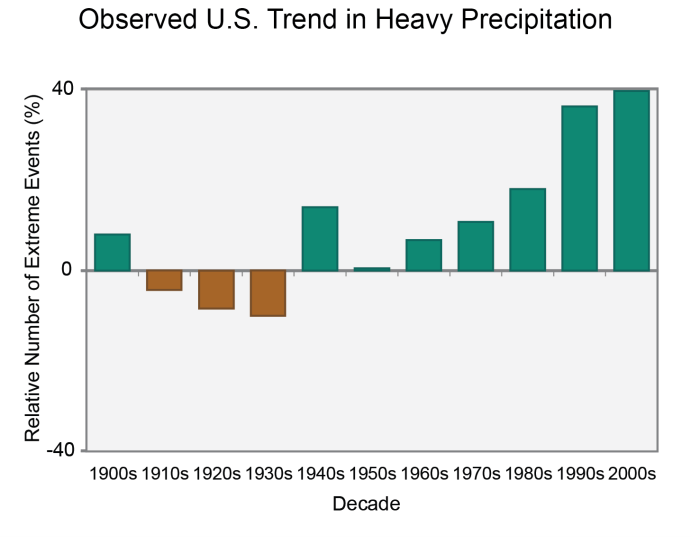In the hours before yesterday’s World Cup football match between the U.S. and Germany, the Brazilian city of Recife was hit by a torrential downpour. A coastal city of 1.5 million people, Recife is used to high humidity and rainfall. But with streets flooded to waist level in some places, players, officials and fans had a tough time even making it to the stadium for the game.

The USA national team huddle in the rain before the start of the World Cup soccer match between the USA and Germany in Recife, Brazil, yesterday. Source: Ricardo Mazalan/Associated Press
In less than 24 hours, the city was drenched by almost 4 inches (100 mm) of rain – a quarter of the monthly average rainfall in a single day. Downpours that lasted for three days also affected the opening match in Natal less than two weeks ago. The World Cup coverage has been accompanied by a multitude of posts on “biblical” flooding (see here, here and here).
We know heavy rainfall events are becoming more common globally and projected to increase in frequency in the future.
In fact, right now back here in the U.S., we are encountering ongoing flooding in the upper Midwest after days of rain. St Paul has declared a state of emergency; levees in Newport, a small town in Minnesota that lies along the Mississippi, are in “terrible condition” and only feet from being breached; Sioux City, Iowa, is experiencing its wettest month ever; and more than a fifth of Wisconsin’s corn crop is in poor or fair condition after drenching rain.
The U.S. National Climate Assessment clearly states that heavy downpours are increasing across the country, especially over the last three to five decades: “The heaviest rainfall events have become heavier and more frequent, and the amount of rain falling on the heaviest rain days has also increased.”

Since 1991, the amount of rain falling in very heavy precipitation events has been significantly above average. This increase has been greatest in the Northeast, Midwest, and upper Great Plains – more than 30% above the 1901-1960 average. Source: U.S. National Climate Assessment 2014.
In a future of more rain and increased flooding, emergency response and disaster preparedness will be forefront on our radars. The challenge is for the U.S. to show leadership and be emergency responders for the global issue that is here with us now — most importantly by reducing our emissions and providing adequate resources to the task at hand. That’s why the president’s proposed resilience fund – that would help communities prepare for climate change and could reduce the need for costly bailouts in the future – is so important.
Henry Paulson, former Secretary of the U.S. Treasury, agrees. This week in the New York Times, Paulson wrote some wise words about the climate crisis: “There is a time for weighing evidence and a time for acting. And if there’s one thing I’ve learned throughout my work in finance, government and conservation, it is to act before problems become too big to manage.” Hear, hear.
